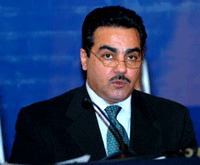
Sunday's Iraqi election results showed a Shiite list has won nearly half of the vote, followed by the Kurdish list and an alliance led by interim Prime Minister Iyad Allawi.
The United Iraqi Alliance, backed by Iraq's Shiite Grand Ayatollah Ali al-Sistani, won 4.075 million votes, or 48.1 percent of the ballots.
A Kurdish alliance followed with 2.175 million votes, or about 25 percent, while 1.168 million votes went to interim Prime Minister Iyad Allawi's list.
About 8.55 million Iraqis cast their votes in the elections, about 59 percent of registered voters, the electoral commission said.
However, turnout in Iraq's Sunni areas was rather low, as many Sunni Arabs had boycotted the elections or stayed away out of fear.
In some areas, the turnout was as low as 2 percent.
The three lists will take 239 seats and the remaining 36 will be shared among other lists, including the list of Ghazi al-Yawar, the interim Iraqi president whose party won only five seats.
About 69 seats will go to women candidates, which means a fourth of the parliamentary seats have been reserved for women, the highest percentage in the Arab parliaments.
Although the Shiite list is likely to take 132 seats, the result was still considered under expectation as some top Shiite officials had estimated a 60 percent win.
Anyway, controlling nearly half of the seats would be influential enough in the political process of the transitional period, which would last until the next elections, analysts said.
The Shiite list has to ally with other parties or individuals to secure its goal of forming a government.
Before results were announced, head of the Supreme Council for Islamic Revolution in Iraq Abdul Aziz Al Hakim, who tops the Shiite list, said his list contained many qualified figures capable of taking any post, but he stopped short of naming one.
It was reported a Shiite leader would have the post of the prime minister, a Sunni would be the president and a Kurd the speaker.
The Shiite list nominated more than four candidates for the post of prime minister -- Ibrahim Al Jaafary, head of Daawa Party, Adel Abdul Mehdi, interim Iraqi finance minister, Ahmed Al Chalabi, head of National Conference Party and Hussein Al Shahristani, a nuclear scientist who is very close to Sistani.
Among the four, Jaafary, who holds the vice presidency, becomes a potential candidate to take the top portfolio as he has been seen consulting with US officials and Iraqi leaders.
However, observers say the consultation may at last lead to a compromise to allow Allawi to stay in his post as the prime minister, since Jaafary's National Accord has only got 38 seats.
In an interview with the UAE-based al-Arabiya TV channel, Hakim kept the door open for accepting figures not from his list to take top positions, although some observers said he won't give up the chance to grab the media in the next months.
The Kurds have also won a political influence, wining a percentage more than their population percentage, due to a high turnout in the Kurdish region in the north.
The results also showed that the biggest looser might be the well-known veteran Sunni politician Adnan al Pachachi, who had been tipped as president but did not win a single seat.
"It is clear, from the number of the voters, that most Iraqis in certain areas did not participate in the elections," he said, but noted that the focus should be on writing the constitution and preparing for a more representative election by the end of 2005.
In the next stage, the elected assembly will choose a president and two deputy presidents, who will in turn designate a prime minister to form a cabinet.
Once the cabinet is approved by a majority of the assembly, the prime minister will lead the transitional government.
(Xinhua News Agency February 14, 2005)
|

